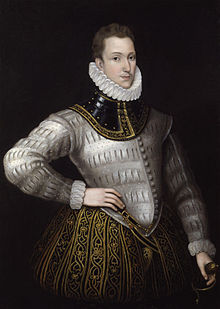1. Only the poet, disdaining to be tied to any such subjection, lifted up with the vigor of his own invention, doth grow, in effect, into another nature, in making things either better than nature brings forth, or, quite anew, forms such as never were in nature, as the heroes, demi-gods, cyclops, chimeras, furies, and such like; so as he goes hand in hand with nature, not enclosed within the narrow warrant of her gifts, but freely ranging within the zodiac of his own wit. Nature never set forth the earth in so rich tapestry as divers poets have done; neither with pleasant rivers, fruitful trees, sweet-smelling flowers, nor whatsoever else may make the too-much-loved earth more lovely; her world is brazen, the poets only deliver a golden.
2. Poesy, therefore, is an art of imitation, for so Aristotle terms it in his word mimēsis, that is to say, a representing, counterfeiting, or figuring forth; to speak metaphorically, a speaking picture, with this end,—to teach and delight.
3. The philosopher therefore and the historian are they which would win the goal, the one by precept, the other by example; but both not having both, do both halt. For the philosopher, setting down with thorny arguments the bare rule, is so hard of utterance and so misty to be conceived, that one that has no other guide but him shall wade in him till he be old, before he shall find sufficient cause to be honest. For his knowledge stands so upon the abstract and general that happy is that man who may understand him, and more happy that can apply what he doth understand. On the other side, the historian, wanting the precept, is so tied, not to what should be but to what is, to the particular truth of things, and not to the general reason of things, that his example draws no necessary consequence, and therefore a less fruitful doctrine.
Now doth the peerless poet perform both; for whatsoever the philosopher says should be done, he gives a perfect picture of it in some one by whom he presupposes it was done, he gives a perfect picture of it in in some one by whom he presupposes it was done, so as he couples the general notion with the particular example.
4. Now therein of all sciences—I speak still of human, and according to the human conceit—is our poet the monarch. For he doth not only show the way, but gives so sweet a prospect into the way as will entice any man to enter into it. Nay, he doth, as if your journey should lie through a fair vineyard, at the very first give you a cluster of grapes, that full of that taste you may long to pass further. He begins not with obscure definitions, which must blur the margent [margin—ed.] with interpretations, and load the memory with doubtfulness. But he comes to you with words set in delightful proportion, either accompanied with, or prepared for, the well-enchanting skill of music; and with a tale, forsooth, he comes unto you, with a tale which holds children from play, and old men from the chimney-corner, and, pretending no more, doth intend the winning of the mind from wickedness to virtue; even as the child is often brought to take most wholesome things, by hiding them in such other as to have a pleasant taste,—which, if one should begin to tell them the nature of the aloes or rhubarb they should receive, would sooner take their physic at their ears than at their mouth. So is it in men, most of which are childish in the best things, till they be cradled in their graves,—glad they will be to hear the tales of Hercules, Achilles, Cyrus, Æneas; and, hearing them, must needs hear the right description of wisdom, valor, and justice; which, if they had been barely, that is to say philosophically, set out, they would swear they be brought to school again.

